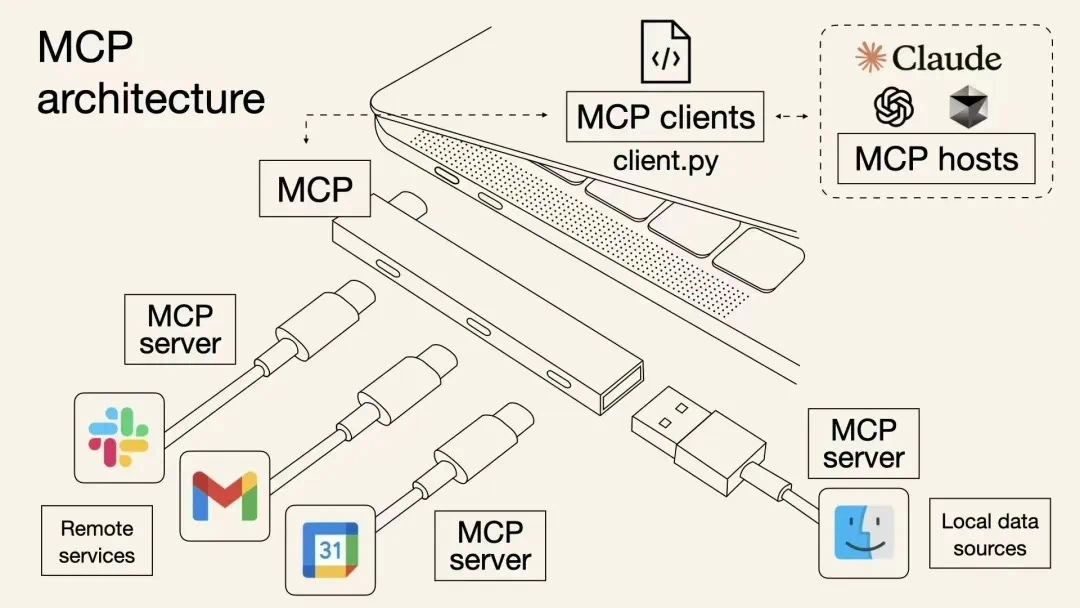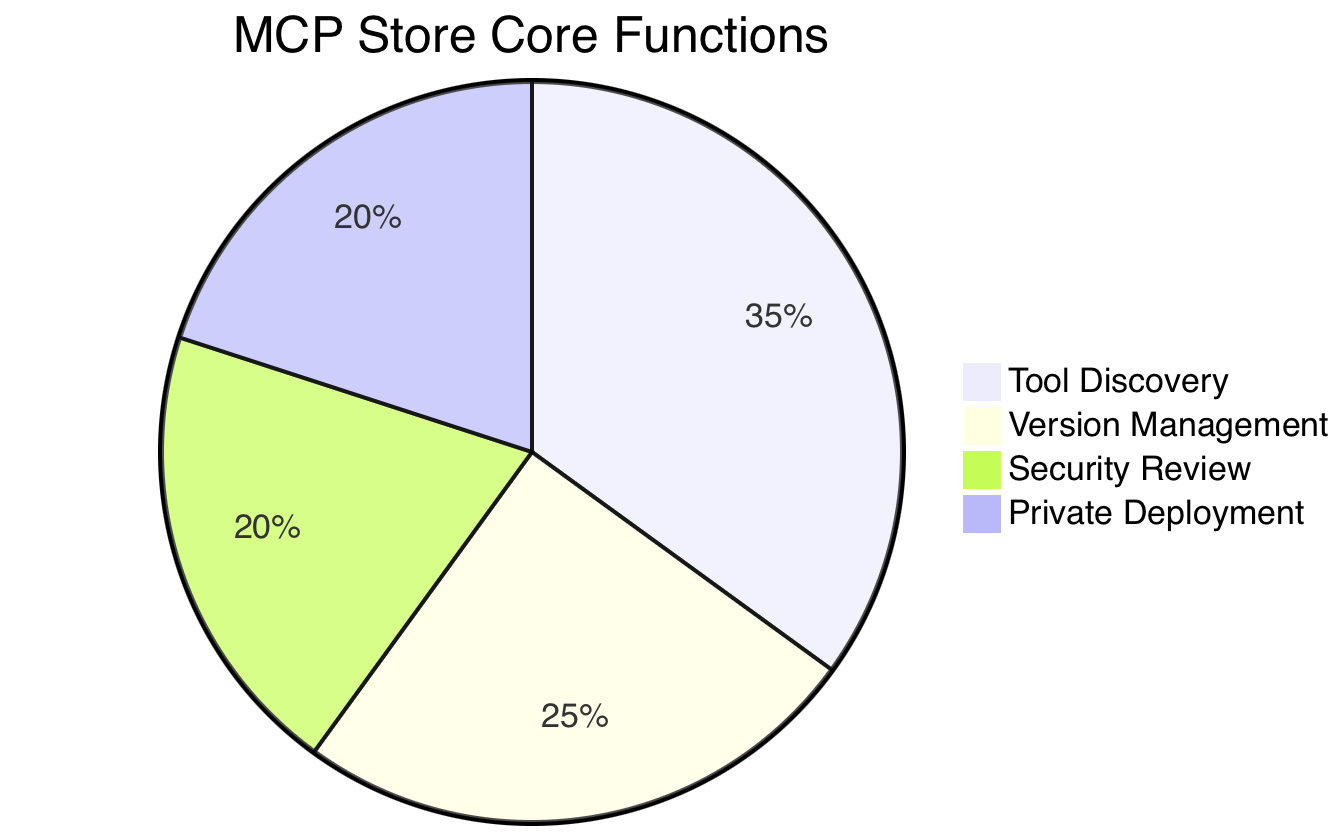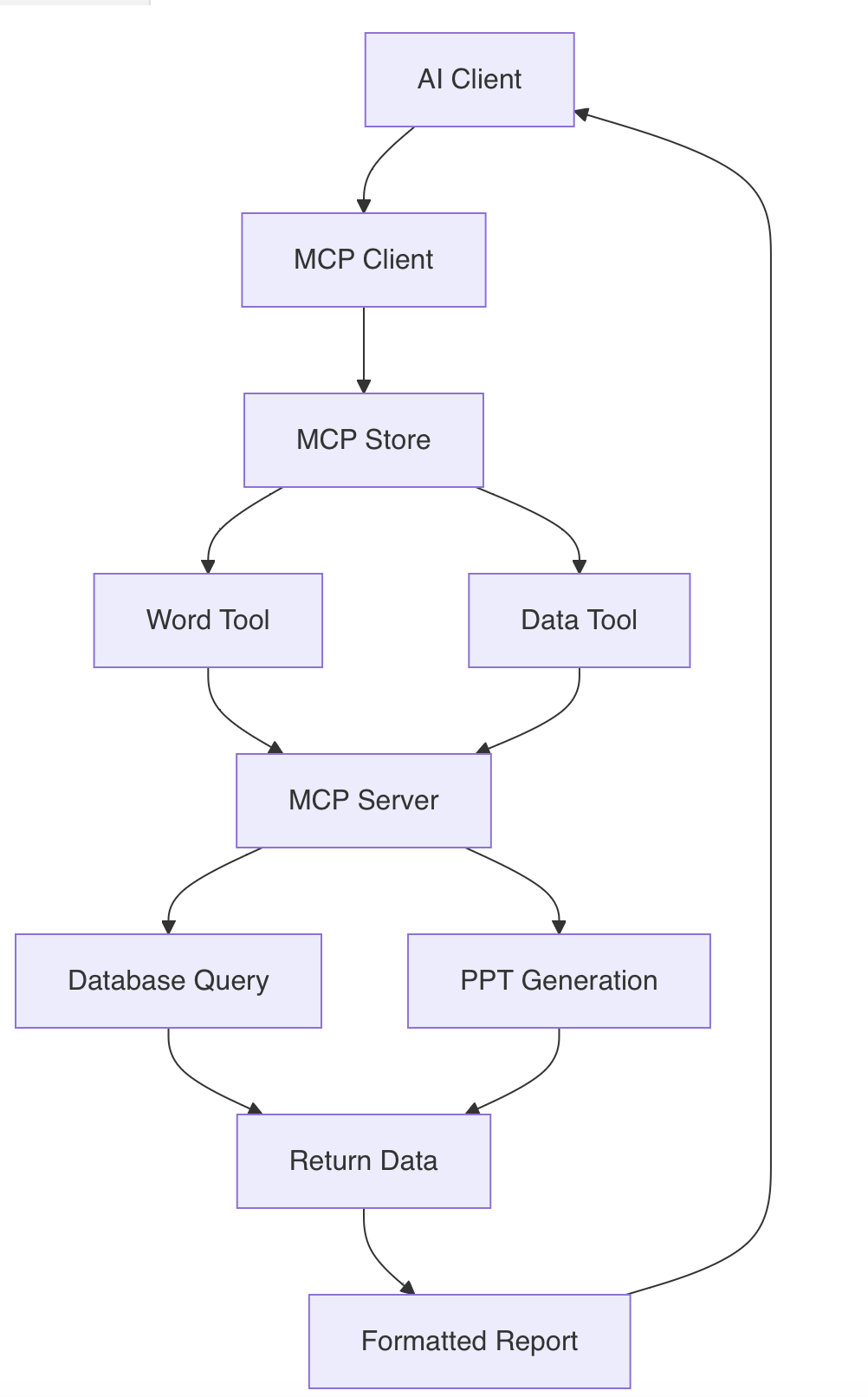Exploring MCP: Empowering AI Models with Enhanced Capabilities
The Fundamental Differences Between MCP Server, Function Call, and Agent
From Tools to Intelligent Agents: What are the essential differences between MCP Server, Function Call, and Agent, and why is it crucial to understand these three concepts? Let's break it down for you.
In today's AI technology explosion, many find themselves confused by the terms MCP Server, Function Call, and Agent. While all claim to "extend AI capabilities," their underlying logic differs significantly. This article provides a straightforward comparison to help you quickly grasp their fundamental differences.
I. Role Comparison
MCP Server: AI's Universal Toolbox
- Essence: Standardized protocol-based data interfaces (e.g., web scraping, database queries, file operations)
- Analogy: Like a standardized screwdriver set - AI follows standard procedures to request tools but doesn't decide which one to use.
Function Call: AI's Swiss Army Knife
- Essence: Built-in model functions (e.g., JSON generation, simple API calls)
- Analogy: A model's built-in folding knife - fixed, lightweight functionality that can't be extended.
Agent: AI's Intelligent Butler
- Essence: Autonomous decision-making chain (planning, tool invocation, error correction)
- Analogy: A chef who can read recipes, choose utensils, and cook independently, even replacing a broken pot when needed.
II. Core Capability Differences
| Dimension | MCP Server | Function Call | Agent |
|---|---|---|---|
| Proactivity | Completely passive (waits for commands) | Passive (model preset functions) | Active task flow planning |
| Extensibility | Unlimited tool addition | Fixed functionality, non-extensible | Depends on external toolchain |
| Complexity | Single function (e.g., weather check) | Lightweight operations (e.g., formatting) | Multi-step reasoning (e.g., code writing) |
| Data Security | Local encrypted processing (sensitive data stays local) | Relies on model's own security | Requires tool invocation permission control |
III. Technical Implementation Differences
Interaction Mode
- MCP Server: Must communicate via HTTP/SSE protocols
- Function Call: Direct internal model processing (e.g., GPT-4's JSON output)
- Agent: Orchestrates multiple MCP Servers and Function Calls (e.g., database query → report generation)
Development Cost
- MCP Server: Requires server deployment but modular design enables reuse (e.g., shared financial industry data interfaces)
- Function Call: Zero deployment cost but limited functionality (can't connect to external systems)
- Agent: Requires workflow engine design, longest development cycle
IV. Typical Application Scenarios
- MCP Server: ✅ Real-time data acquisition (stock quotes) ✅ Sensitive operation isolation (hospital record queries)
- Function Call: ✅ Quick data formatting (conversation to ticket) ✅ Simple logic validation (address verification)
- Agent: ✅ Complex task decomposition (auto code → test → deploy) ✅ Dynamic error correction (switching backup plans when API calls fail)
In today's rapidly evolving AI landscape, enabling AI models to better interact with the external world has become a key focus for developers and enterprises. The emergence of MCP (Model Context Protocol) provides a standardized, secure, and efficient solution to this challenge. This article will guide you through MCP's core concepts, functional advantages, and how to get started quickly.
What is MCP?
MCP (Model Context Protocol) is an open protocol designed to provide AI models with a secure and standardized interface for interacting with both local and remote resources. Through MCP, AI models can access files, connect to databases, call APIs, control devices, and even execute code. Simply put, MCP acts as a bridge connecting AI models with the external world. Beyond the formal definition, the following diagram makes the MCP concept easier to understand:

MCP Clients:
- Shown as a component containing client.py
- Connected to MCP hosts on the right, which include Claude, Anthropic, and other services
MCP Servers:
- Multiple MCP server instances appear in the diagram
- These servers connect to various external services and data sources
Remote Services:
- Includes third-party services like Slack, Gmail, Google Calendar
- Connected to MCP servers via USB-style interfaces
Local Data Sources:
- Shows Mac computer connections to local data sources in the bottom right
MCP Hosts:
- Contains AI services like Claude
- Engages in bidirectional communication with MCP clients
MCP's core objective is to expand AI models' capability boundaries while ensuring interaction security and controllability. It achieves this by defining unified interfaces and protocols, enabling AI models to consistently access various resources and services.
MCP Design Principles
- Security: MCP ensures AI models can only access authorized resources through strict permission controls and security mechanisms, preventing potential security risks.
- Standardized Interface: All tools and services follow the same protocol format, simplifying integration and reducing development costs.
- Extensibility: Developers can easily add new features and services to meet different scenario requirements.
- Interoperability: Different AI models and clients can share the same MCP servers for seamless collaboration.
- Local and Remote Access: Supports both local tools and cloud service integration, providing maximum flexibility.
MCP Ecosystem
The MCP ecosystem consists of several key components:
MCP Client: AI's "Dedicated Translator" (Like a Food Delivery Platform's Middleman)
- Core Function: Translates AI's "human language" into machine instructions Example: When AI says "help me check Tencent's stock data" → translates to SQL query
- Workflow:
- Receives AI's voice/text requests
- Automatically matches the most suitable MCP Server
- Translates results back into AI-understandable format
MCP Server: AI's "Universal Toolbox" (Each Tool is a Specialist)
| Tool Type | Specific Capabilities | Real-world Analogy |
|---|---|---|
| File Manager | Automatic folder organization | 10x smarter than Windows Explorer |
| Database Agent | Instant million-record queries | Like a mind-reading librarian |
| API Liaison | Simultaneous WeChat/DingTalk/Feishu integration | Super connector for social platforms |
Typical Scenario: When AI needs to analyze sales data, it automatically combines:
- Database tools to retrieve order records
- Excel tools to generate visual charts
- Email tools to send analysis reports
MCP Store: AI's "Tool Supermarket" (Like a Smart Version of Mobile App Store)

Enterprise Special Services:
- Secure Repository: Establish internal tool libraries (e.g., bank-specific risk control toolset)
- Smart Recommendations: Recommend tools based on usage patterns (like product recommendation systems)
- Silent Updates: Update at 2 AM without service interruption
The Three Components Work Like a Food Delivery Ecosystem
| Role | Food Delivery Analogy | MCP Ecosystem Equivalent |
|---|---|---|
| Requester | Customer ordering | AI making requests |
| Translator | Platform routing to kitchen | MCP Client |
| Executor | Restaurant chef | MCP Server |
| Resource Pool | Merchant platform | MCP Store |
Complete Process Example:

Common MCP Clients
| Name | Website | Type | Supported Platforms | Pricing |
|---|---|---|---|---|
| 5ire | https://5ire.app/ | Desktop App | Win/Mac/Linux | Free |
| AIaW | https://aiaw.app/ | Web App | Web | Free |
| Chainlit | https://chainlit.io/ | Web Framework | Web | Free |
| ChatMCP | - | Desktop App | Win/Mac/Linux | Free |
| Cherry Studio | https://cherry-ai.com | Desktop App | Win/Mac/Linux | Free |
| Claude Desktop | https://claude.ai/download | Desktop App | Win/Mac | Free |
| ClaudeMind | https://claudemind.com/ | IDE Plugin | Win/Mac | Per Seat |
| Cline | VS Code Plugin Page | VSCode Plugin | Win/Mac | Free |
| console-chat-gpt | - | CLI Tool | Cross-platform | Free |
| Copilot-MCP | - | VSCode Plugin | Cross-platform | Free |
| Cursor | https://cursor.com | Smart Editor | Cross-platform | Freemium |
| Continue | https://continue.dev/ | IDE Plugin | Win/Mac | Free |
| DeepChat | https://deepchat.thinkinai.xyz/ | Desktop App | Cross-platform | Free |
| Dolphin-MCP | - | CLI/Python Lib | Cross-platform | Free |
| FLUJO | flujo.orchestraight.co | Web App | Web | Free |
| Goose | - | AI Agent | Mac/Linux | Free |
| HyperChat | - | Desktop App | Win/Mac | Free |
| kibitz | https://kibi.tz | Cross-platform | Mobile/Desktop | Free |
| LibreChat | https://www.librechat.ai/ | Web App | Web | Free |
| MCP Chatbot | - | CLI Tool | Cross-platform | Free |
| MCP CLI client | - | CLI Tool | Cross-platform | Free |
| MCP Simple Slackbot | - | Slack Bot | Slack | Free |
| MCPOmni Connect | - | CLI Tool | Cross-platform | Free |
| Nerve | GitHub Page | CLI Tool | Cross-platform | Free |
| NextChat | https://nextchat.club/ | Web App | Cross-platform | Free |
| oterm | - | CLI Tool | Cross-platform | Free |
| Superinterface | https://superinterface.ai | Web App | Web | Freemium |
| SeekChat | https://seekrays.com/chat/ | Desktop App | Win/Mac | Free |
| Tester MCP Client | Apify Page | Web App | Web | Freemium |
| VS Code GitHub Copilot | https://code.visualstudio.com/ | IDE Plugin | Cross-platform | Subscription |
| Windsurf | https://codeium.com/windsurf | Smart IDE | Cross-platform | Freemium |
| Witsy | https://witsyai.com | Desktop App | Cross-platform | Free |
| Enconvo | https://enconvo.com | Desktop App | Mac | Freemium |
| y-cli | - | CLI Tool | Cross-platform | Free |
| Zed | https://zed.dev/ | Editor | Cross-platform | Free |
| MindPal | https://mindpal.io | Web Platform | Web | Freemium |
| WhatsMCP | https://wassist.app/mcp/ | Mobile App | Freemium |
Common MCP Servers
| Name | Category | Language | Deployment Type | Description |
|---|---|---|---|---|
| julien040/anyquery | Aggregator | Go | Local/Cloud | Query 40+ apps with SQL, supporting PostgreSQL, MySQL, or SQLite compatible databases |
| PipedreamHQ/pipedream | Aggregator | - | Cloud/Local | Connect 2,500 APIs and 8,000+ pre-built tools |
| OpenMCP | Aggregator | TypeScript | Local | Convert Web API to MCP server in 10 seconds |
| VeriTeknik/pluggedin-mcp-proxy | Aggregator | TypeScript | Local | Integrate multiple MCP servers into a single interface |
| MetaMCP | Aggregator | TypeScript | Cloud/Local | Unified middleware MCP server for managing MCP connections |
| abhiemj/manim-mcp-server | Arts & Culture | Python | Local | Local MCP server for generating animations using Manim |
| burningion/video-editing-mcp | Arts & Culture | Python | - | Add, analyze, search, and generate video edits |
| djalal/quran-mcp-server | Arts & Culture | TypeScript | Cloud | Interact with Quran content via official REST API |
| bilibili-mcp-js | Browser Automation | TypeScript | Local | Support for searching Bilibili content |
| mcp-server-playwright | Browser Automation | Python | - | MCP server for browser automation using Playwright |
| browsermcp/mcp | Browser Automation | TypeScript | Local | Automate local Chrome browser |
| mcp-ipfs | Cloud Platform | TypeScript | Cloud | Upload and operate IPFS storage |
| aws-mcp-server | Cloud Platform | Python | Cloud | Lightweight powerful server enabling AI assistants to execute AWS CLI commands |
| pydantic/mcp-run-python | Code Execution | Python | Local | Run Python code in secure sandbox via MCP tool calls |
| yepcode/mcp-server-js | Code Execution | TypeScript | Cloud | Execute LLM-generated code in secure, scalable sandbox environment |
| oraios/serena | Code Agent | Python | Local | Full-featured coding agent relying on language server for symbolic code operations |
| ezyang/codemcp | Code Agent | Python | Local | Coding agent with basic read/write and command-line tools |
| iterm-mcp | Command Line | - | - | MCP server providing iTerm access |
| mcp-server-commands | Command Line | TypeScript | Local | Run any commands using run_command and run_script tools |
| nostr-mcp | Communication | - | Cloud | MCP server allowing interaction with Nostr |
| mcp-twikit | Communication | Python | Cloud | Interact with Twitter search and timeline |
| mcp-aiven | Database | Python | Cloud | Navigate Aiven projects and interact with PostgreSQL, Apache Kafka services |
| supabase-mcp-server | Database | - | - | Supabase MCP server supporting SQL query execution and database exploration tools |
| dbhub | Database | TypeScript | Local | Universal database MCP server supporting mainstream databases |
| mcp-flowcore-platform | Data Platform | TypeScript | Cloud/Local | Execute operations, ingest data, and analyze with Flowcore |
| mcp-databricks-server | Data Platform | - | - | Connect to Databricks API, run SQL queries, and manage jobs |
| Magic-MCP | Development Tools | - | - | Create UI components inspired by 21st.dev design engineers |
| qasphere-mcp | Development Tools | TypeScript | Cloud | Integrate with QA Sphere test management system |
| chronulus-mcp | Data Science | Python | Cloud | Make predictions using Chronulus AI prediction and forecasting agents |
| mcp-server-data-exploration | Data Science | Python | Cloud | Autonomous data exploration for .csv-based datasets |
| esp-mcp | Embedded Systems | - | Embedded | Workflow for fixing ESP32 series chip build issues |
| llm-context.py | File System | Python | Local | Share code context with LLM via MCP or clipboard |
| mcp-file-merger | File System | Go | Local | File merging tool suitable for AI chat length limits |
| coinmarket-mcp-server | FinTech | Python | Cloud | Coinmarket API integration for cryptocurrency listings and quotes |
| onchain-mcp | FinTech | TypeScript | Cloud | Interact with Bankless Onchain API and smart contracts |
Summary and Reflections: MCP's Future and Challenges
As AI technology continues to advance, the introduction of the MCP protocol provides a standardized, secure, and efficient solution for AI models to interact with the external world. Through MCP, AI models are no longer limited to generating text or images but can access and operate external resources like humans to complete complex tasks. However, MCP's future development and application still face some challenges and opportunities.
1. Future Development Directions
- More Powerful Tool Integration: As the MCP ecosystem expands, more tools and services will be integrated into the MCP Store, further extending AI models' capability boundaries. For example, future MCP might support more complex tools like automated code generation and intelligent data analysis.
- Higher Autonomy: Agents, as intelligent entities in the MCP ecosystem, may achieve higher autonomy. Future agents might possess stronger planning capabilities and self-correction abilities, enabling more flexible responses to complex tasks and dynamic environments.
- Broader Application Scenarios: MCP applications may expand from enterprise-level to individual users. For instance, future MCP protocols might be integrated into smart homes, autonomous driving, and other fields, allowing AI models to serve human life more extensively.
2. Challenges Facing MCP
- Security Issues: Although MCP ensures resource access security through strict permission controls and security mechanisms, some potential security risks still need to be addressed in practical applications. For example, how to prevent malicious attackers from obtaining unauthorized resource access through the MCP protocol.
- Standardization and Compatibility: The standardization and compatibility issues of the MCP protocol need further resolution. Tools and services from different vendors and platforms need to follow unified protocols and interfaces to achieve seamless collaboration.
- Development Costs and Barriers: Although MCP reduces development costs through modular design and standardized interfaces, deploying and maintaining MCP servers still presents certain barriers for some small enterprises and individual developers. Future efforts should focus on simplifying development processes and reducing usage costs.
3. Practical Significance
The emergence of the MCP protocol not only extends AI models' capability boundaries but also provides new possibilities for enterprise digital transformation. Through MCP, enterprises can more efficiently integrate internal resources and services, enhancing business process automation. For example, the financial industry can quickly call databases and APIs through MCP to complete real-time data analysis and risk assessment; the healthcare industry can securely access medical records and devices through MCP to improve diagnosis and treatment efficiency.
4. Future Outlook: Deep Integration of MCP and AI
As the MCP protocol continues to develop, AI models' interaction with the external world will become more intelligent and automated. Future AI models might become like humans, possessing stronger autonomy and adaptability to independently complete complex tasks. For instance, future AI models might function like all-around assistants, capable of handling various tasks simultaneously, such as file management, data analysis, and code generation.
5. Frequently Asked Questions
- Q1: What's the difference between MCP and API?
- A1: MCP is a standardized protocol for unified management and invocation of various tools and services, while API is a specific service interface typically used to implement particular functions. MCP can be seen as a higher-level protocol that can simultaneously manage and invoke multiple APIs.
- Q2: What scenarios is MCP suitable for?
- A2: MCP is suitable for scenarios requiring AI models to interact with external resources, such as real-time data acquisition, complex task automation, and multi-step reasoning.
- Q3: How is MCP's security ensured?
- A3: MCP ensures AI models can only access authorized resources through strict permission controls, local encrypted processing, and tool invocation permission management, avoiding potential security risks.
- Q4: How to quickly get started with MCP?
- A4: You can quickly obtain and deploy MCP Servers through the MCP Store, while using MCP Client as a translator to convert AI's requirements into specific tool invocation instructions.
6. Conclusion
The emergence of the MCP protocol marks a significant step forward in AI technology from simple text generation to broader intelligent applications. Through standardized interfaces and protocols, AI models can interact with the external world more securely and efficiently to complete complex tasks. In the future, as the MCP ecosystem continues to improve and expand, AI technology will create greater value for human society.